大学日语四级专业考试 完形填空及答案 2008年
2008年专四答案解析
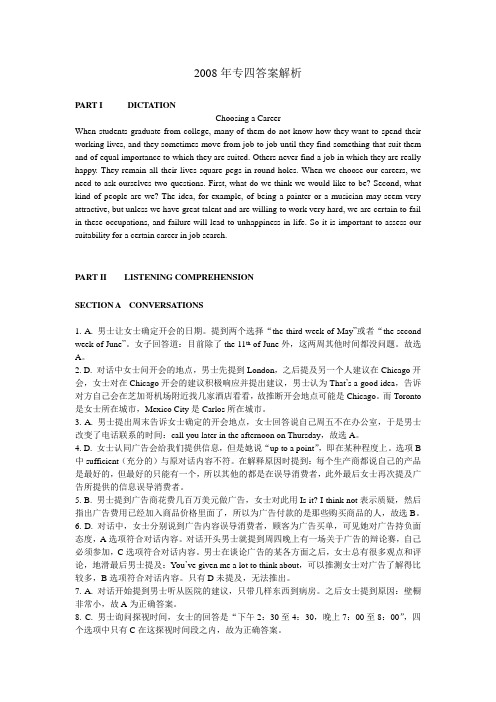
2008年专四答案解析PART I DICTATIONChoosing a CareerWhen students graduate from college, many of them do not know how they want to spend their working lives, and they sometimes move from job to job until they find something that suit them and of equal importance to which they are suited. Others never find a job in which they are really happy. They remain all their lives square pegs in round holes. When we choose our careers, we need to ask ourselves two questions. First, what do we think we would like to be? Second, what kind of people are we? The idea, for example, of being a painter or a musician may seem very attractive, but unless we have great talent and are willing to work very hard, we are certain to fail in these occupations, and failure will lead to unhappiness in life. So it is important to assess our suitability for a certain career in job search.PART II LISTENING COMPREHENSIONSECTION A CONVERSATIONS1. A. 男士让女士确定开会的日期。
08年日语专四正解

2008年度4級参考答案(每小题1分)一、1.D 2.B 3.C 4.A 5.D 6.A7.A8.B9.A 10.C11.C12.A13.B14.C15.D16.B17.D18.D19.C20.B二、21.A22.C23.B24.B25.A26.D27.C28.C29.D30.B三、31.B32.C33.D34.D35.A36.C37.B38.A39.C40.A41.A42.D43.B44.D45.C四、46.D47.A48.C49.B50.C51.A52.D53.C54.B55.D56.A57.D58.B59.A60.B五、61.D62.A63.C64.B65.A66.B67.C68.B69.A70.D六、71.C72.A73.A74.D75.B76.B77.D78.C79.B80.C81.A82.B83.A84.D85.C文完成の回答例七、次の文を完成しなさい(解答は解答用紙に書きなさい)。
(1×10=10点)86.酒を飲んで運転すると、事故を起こしかねない。
87.寿命の延びは医学の進歩に負うところが少なくない。
88.どんなに欲しくても人のものを盗むべきではない。
89.あのチームは圧倒的に強いから勝つに決まっている。
90.ここ数年、発癌物質は増えるいっぽうである。
91.推薦状は名誉のある先生に書いていただいたほうがいいです。
92.心配で心配でとてもじっとしてはいられない。
93.あの角を左にまがってまっすぐ行くと広い道に出られます。
94.あの店の電話はいつも話し中で、なかなかつながりません。
95.登校拒否の生徒数は減少するどころかかえって増加する一方だ。
四級作文評分標準一、12~15分(相当于80~100分):切题*,文章通顺,言之有物,用词贴切,无重大语法错误或其他表达错误;*切题是指文章能紧扣题目,还包含体裁(记叙文抑或说明文等)对。
二、9~11分(相当于60~79分):切题,文章基本通顺,言之有物,用词尚可,有少量重大语法错误或其他表达错误;三、6~8分(相当于40~59分):基本切题;文章欠通顺,言之无物或只是罗列,重大语法错误和其他表达错误多;四、0~5分(相当于0~39分):不切题,文章不通顺,不但无甚内容,且前后矛盾,错误连篇,基本上不知所云;五、在上述基础上的追加扣分:1.格式不对,扣半分;2.文体不同,扣半分;3.字数超过或少于规定字数达1行以上,扣半分;六、作文最终成绩为整分,不要出现小数点以下的分(例如0.5分)。
2008年日语四级考试试题
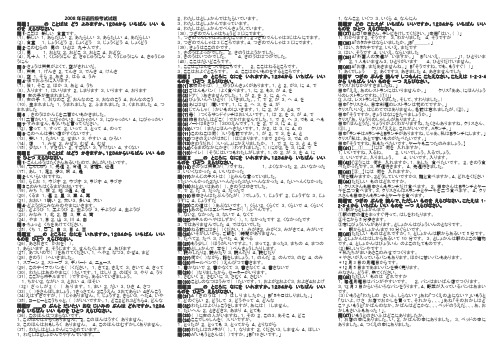
2008年日语四级考试试题問題Ⅰ___のことばはどうよみますか。
1234からいちばんいいものをえらびなさい。
問1・ここは新しい食堂です。
(1).新しい1.あらだしい2.あたらしい3.あらたしい4.あだらしい(2).食堂1.しょうくどう2.じょくどう3.じょうくどう4.しょくどう問2・このむらの男のひとは九十人です。
(3).男1.おとな2.おどこ3.おとこ4.おどな(4).九十人1.くじゅうにん2.きゅじゅうにん3.くうじゅうにん4.きゅうじゅうにん問3・きょうは天気がよくて、空がきれいだ。
(5).天気1.げんき2.てんき3.でんき4.けんき(6).空1.そら2.あき3.はる4.うみ問4・後でおふろに入ります。
(7).後1.そこ2.ほか3.あと4.うち(8).入ります1.はいります2.しまります3.いります4.おります問5 女の子が生まれました。
(9).女の子1.おなのこ2.おんなのこ3.おなのこう4.おんなのこう(10).生まれました1.うまれました2.ふまれました3.くまれました4.つまれました問6 .きのうはかんじを二百かいもかきました。
(11)二百かい1.にびゃかい2.にひゃかい3.にひゃっかい4.にびゃっかい問7・すみません、もういちど言ってください。
(12).言って1.すって2.いって3.とって4.のって問8・このへんは安い店がすくないです。
(13).安い1.たかい2.せまい3.やすい4.ひろい(14).店1.みせ2.みぜ3.むぜ4.むせ(15).少ない1.すきない2.すこない3.すけない4.すくない問題Ⅱ___のことばはどうかきますか。
1234からいちばんいいものをひとつえらびなさい。
問1・こんしゅうはたくさんあるいたので、あしがいたいです。
(161.先週2.今週(17).あし1.足2.歩3.呎4.是問2・いいらいおですね。
(18).らじお1.ウジオ2.ウヅオ3.ラジオ4.ラヅオ問3このみちはくるまがおおいです。
2008年四级考试真题
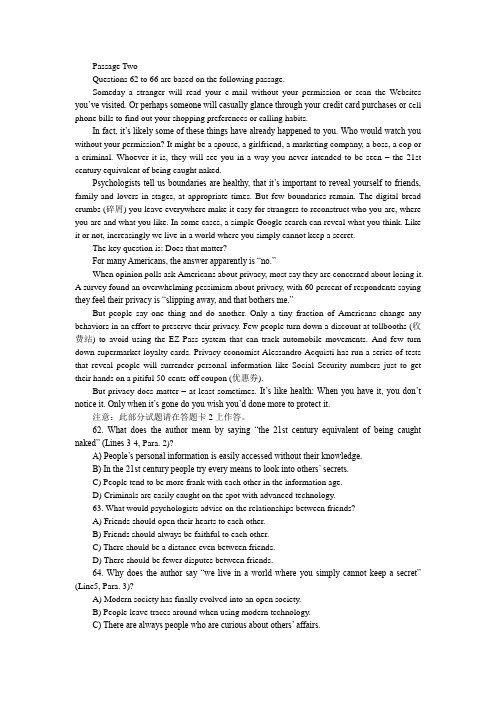
Passage TwoQuestions 62 to 66 are based on the following passage.Someday a stranger will read your e-mail without your permission or scan the Websites you’ve visited. Or perhaps someone will casually glance through your credit card purchases or c ell phone bills to find out your shopping preferences or calling habits.In fact, it’s likely some of these things have already happened to you. Who would watch you without your permission? It might be a spouse, a girlfriend, a marketing company, a boss, a cop or a criminal. Whoever it is, they will see you in a way you never intended to be seen –the 21st century equivalent of being caught naked.Psychologists tell us boundaries are healthy, that it’s important to reveal yourself to friends, family and lovers in stages, at appropriate times. But few boundaries remain. The digital bread crumbs (碎屑) you leave everywhere make it easy for strangers to reconstruct who you are, where you are and what you like. In some cases, a simple Google search can reveal what you think. Like it or not, increasingly we live in a world where you simply cannot keep a secret.The key question is: Does that matter?For many Americans, the answer apparently is ―no.‖When opinion polls ask Americans about privacy, most say they are concerned about losing it.A survey found an overwhelming pessimism about privacy, with 60 percent of respondents saying they feel their privacy is ―slipping away, and that bothers me.‖But people say one thing and do another. Only a tiny fraction of Americans change any behaviors in an effort to preserve their privacy. Few people turn down a discount at tollbooths (收费站) to avoid using the EZ-Pass system that can track automobile movements. And few turn down supermarket loyalty cards. Privacy economist Alessandro Acquisti has run a series of tests that reveal people will surrender personal information like Social Security numbers just to get their hands on a pitiful 50-cents-off coupon (优惠券).But privacy does matter – at least sometimes. It’s like health: When you have it, you don’t notice it. Only when it’s gone do you wish you’d done more to protect it.注意:此部分试题请在答题卡2上作答。
2008年成人高考高起点日语试题及答案
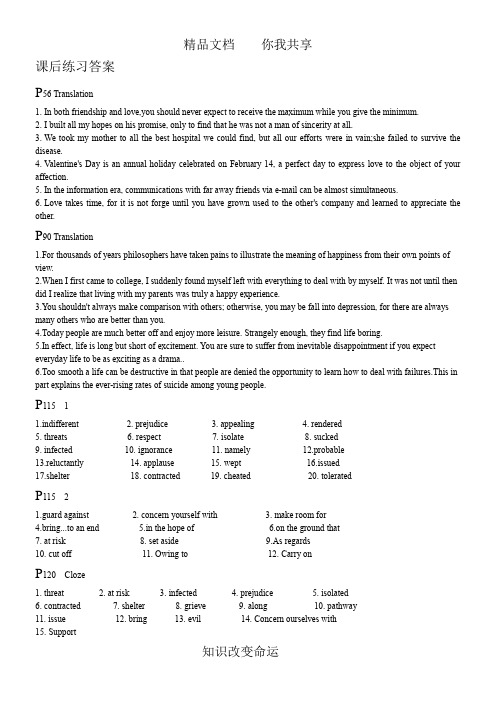
课后练习答案P56 Translation1.In both friendship and love,you should never expect to receive the maximum while you give the minimum.2.I built all my hopes on his promise, only to find that he was not a man of sincerity at all.3.We took my mother to all the best hospital we could find, but all our efforts were in vain;she failed to survive the disease.4.Valentine's Day is an annual holiday celebrated on February 14, a perfect day to express love to the object of your affection.5.In the information era, communications with far away friends via e-mail can be almost simultaneous.6.Love takes time, for it is not forge until you have grown used to the other's company and learned to appreciate the other.P90 Translation1.For thousands of years philosophers have taken pains to illustrate the meaning of happiness from their own points of view.2.When I first came to college, I suddenly found myself left with everything to deal with by myself. It was not until then did I realize that living with my parents was truly a happy experience.3.You shouldn't always make comparison with others; otherwise, you may be fall into depression, for there are always many others who are better than you.4.Today people are much better off and enjoy more leisure. Strangely enough, they find life boring.5.In effect, life is long but short of excitement. You are sure to suffer from inevitable disappointment if you expect everyday life to be as exciting as a drama..6.Too smooth a life can be destructive in that people are denied the opportunity to learn how to deal with failures.This in part explains the ever-rising rates of suicide among young people.P115 11.indifferent2. prejudice3. appealing4. rendered5. threats6. respect7. isolate8. sucked9. infected 10. ignorance 11. namely 12.probable13.reluctantly 14. applause 15. wept 16.issued17.shelter 18. contracted 19. cheated 20. toleratedP115 21.guard against2. concern yourself with3. make room for4.bring...to an end5.in the hope of6.on the ground that7. at risk 8. set aside 9.As regards10. cut off 11. Owing to 12. Carry onP120 Cloze1. threat2. at risk3. infected4. prejudice5. isolated6. contracted7. shelter8. grieve9. along 10. pathway11. issue 12. bring 13. evil 14. Concern ourselves with15. SupportP120 Translation1.They took their sick father on a long journey to Beijing in the hope of curing his heart disease.2.The campaign of Knowing More About AIDS needs to be carried on, and at this stage the emphasis is put on the way the disease is contracted.3.If power is properly used, the lives of the common people will be rendered happy. If not, their daily life will be placed under threat.4.Could a government justifiably use nuclear weapons to guard against terrorist attacks?5.Owing to ignorance of the disease, many people still believe the HIV victims deserve what they suffer.6.The newly issued report on improving the medical system in rural areas leads us to believe that the era is to be brought to an end when such areas are always short of doctors and medicines.P164 11. associate2. equipped3. combined4. emphasis5. enlighten6. phase7. graded8. Commented9.inspection 10.passively11. rural 12. negotiate 13. indispensable 14. illusion15.implemented 16. decline 17. reconcile 18. practically19. residents 20. VirtualP166 21. so to speak2. try out3. in store4. Lend themselves to5. turn my back on6.in accordance with7. crying out for8. is... the case 9. step in 10. clam down 11. brought back12.go after 13. reflect on 14. get out of 15. For want for16. Oddly enough 17.in favour of 18. In turn 19. hit on/upon20. to this end 21. calls for 22. Brought aboutP170 Cloze1. To this end2. in store3. indispensable4. Calls for5. diversity6. implement7. in accordance with8. emphasis9. combining 10 in depth 11. equip 12. goes after13. access 14.get out ofP171 Translation1.Cultivating the right emotions is indispensable in that it lays the foundation for the successes of one's future work and studies.2.The development of West China is crying for talents. To this end, the government has made favorable policies, calling for more college graduates to go and work there.3.How can you turn your back on me when I am in such difficulty? We have gone through trials and tribulations for practically half a century.4.Web addicts spend so much time on the Internet that they are unable to draw a distinction between the virtual world an the real world .5.City residents often have the illusion that rural life is leisurely and comfortable. In fact, that might not be the case.6.Distance leaning is a global trend. With its quick development, people can enjoy an equallyConvenient access to educational resources no matter where they are.口试试题及答案一.朗读课文段落1.Unite 1 P3 第一、二自然段2.Unite 2 P35 第七自然段P38 第十二自然段3.Unite 3 P70 第十自然段P71 第十一自然段4.Unite 4 P100 第三、四自然段二.搭档对话1.Talk with your partners about the advantages and disadvantages of exercises.和你的搭档谈谈锻炼的优势和劣势。
2008年JLPT4级试卷

2008年JLPT4级试卷文字·語彙 (100点 25分)もんだいⅠ___はどうよみますか。
1、2、3、4からいちばんいいものをえらびなさい。
とい1ここは新しい食堂です。
1.新しい1あらだしい2あたらしい3あらたしい4あだらしい2.食堂1しょうくどう2じょくどう3じょうくどう4しょくどうとい2このむらの男のひとは九十人です。
3.男1おとな2おどこ3おとこ4おどな4.九十人1くじゅうにん2きゅじゅうにん3くうじゅうにん4きゅうじゅうにんとい3きょうは天気がよくて空がきれいだ。
5.天気1げんき2てんき3でんき4けんき6.空1そら2あき3はる4うみとい4後でおふろに入ります。
7.後1そこ2ほか3あと4うち8.入リます1はいります2しまります3いります4おりますとい5女の子が生まれました。
9.女の子1おなのこ2おんなのこ3おなのこう4おんなのこう10.生まれました1うまれました2ふまれました3くまれました4つまれましたとい6きのうはかんじを二百かいもかきました。
11.二百かい1にびゃかい2にひゃかい3にひゃっかい4にびゃっかいとい7すみません、もういちど言ってください。
12.言って1すって2いって3とって4のってとい8このへんは安い店が少ないです。
13.安い1たかい2せまい3やすい4ひろい14.店1みせ2みぜ3むぜ4むせ15.少ない1すきない2すこない3すけない4すくないもんだいⅡ___はどうかきますか。
1、2、3、4からいちばんいいものをえらびなさい。
とい1こんしゅうはたくさんあるいたので、あしがいたいです.16.こんしゅう1先週2今週3合週4近週17.あし1足2歩3哫4是とい2いいらじおですね。
18.らじお1ウジオ2ウヅオ3ラジオ4ラヅオとい3このみちはくるまがおおいです。
19.みち1坂2地3通4道20.くるま1運2里3車4軍21.おおい1明い2太い3多い4大いとい4どようびにみなみのやまにいきます。
专四20篇完形填空专项训练(附答案)
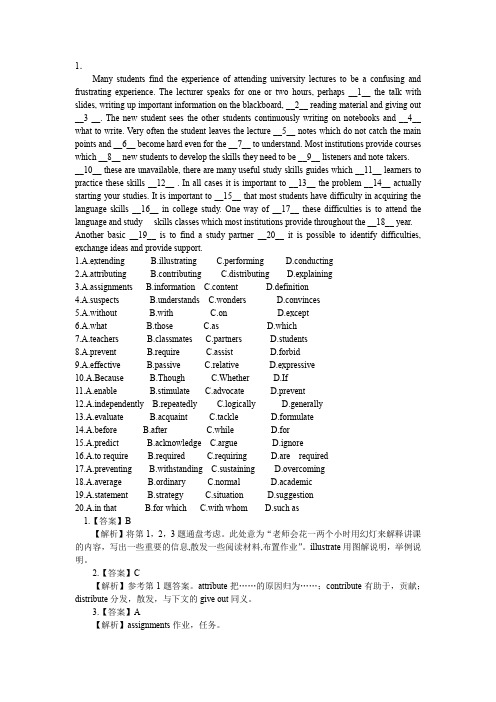
1.Many students find the experience of attending university lectures to be a confusing and frustrating experience. The lecturer speaks for one or two hours, perhaps __1__ the talk with slides, writing up important information on the blackboard, __2__ reading material and giving out __3 __. The new student sees the other students continuously writing on notebooks and __4__ what to write. Very often the student leaves the lecture __5__ notes which do not catch the main points and __6__ become hard even for the __7__ to understand. Most institutions provide courses which __8__ new students to develop the skills they need to be __9__ listeners and note-takers.__10__ these are unavailable, there are many useful study-skills guides which __11__ learners to practice these skills __12__ . In all cases it is important to __13__ the problem __14__ actually starting your studies. It is important to __15__ that most students have difficulty in acquiring the language skills __16__ in college study. One way of __17__ these difficulties is to attend the language and study-skills classes which most institutions provide throughout the __18__ year. Another basic __19__ is to find a study partner __20__ it is possible to identify difficulties, exchange ideas and provide support.1.A.extending B.illustrating C.performing D.conducting2.A.attributing B.contributing C.distributing D.explaining3.A.assignments rmation C.content D.definition4.A.suspects B.understands C.wonders D.convinces5.A.without B.with C.on D.except6.A.what B.those C.as D.which7.A.teachers B.classmates C.partners D.students8.A.prevent B.require C.assist D.forbid9.A.effective B.passive C.relative D.expressive10.A.Because B.Though C.Whether D.If11.A.enable B.stimulate C.advocate D.prevent12.A.independently B.repeatedly C.logically D.generally13.A.evaluate B.acquaint C.tackle D.formulate14.A.before B.after C.while D.for15.A.predict B.acknowledge C.argue D.ignore16.A.to require B.required C.requiring D.are required17.A.preventing B.withstanding C.sustaining D.overcoming18.A.average B.ordinary C.normal D.academic19.A.statement B.strategy C.situation D.suggestion20.A.in that B.for which C.with whom D.such as1.【答案】B【解析】将第1,2,3题通盘考虑。
2008年日语专业四级听力考试文字材料
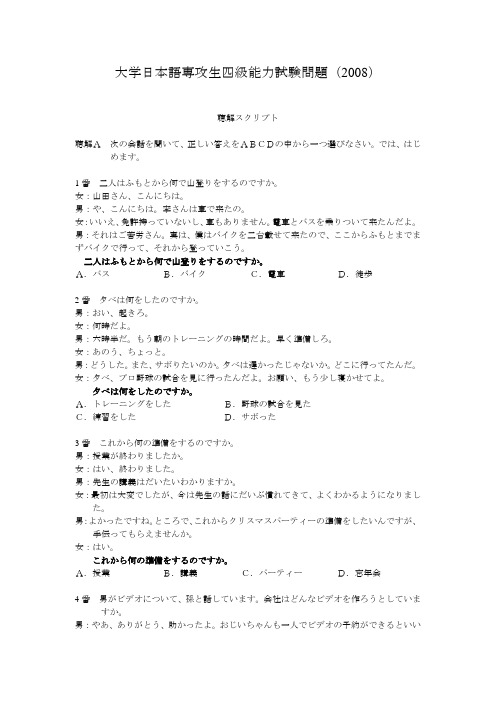
大学日本語専攻生四級能力試験問題(2008)聴解スクリプト聴解A次の会話を聞いて、正しい答えをABCDの中から一つ選びなさい。
では、はじめます。
1番二人はふもとから何で山登りをするのですか。
女:山田さん、こんにちは。
男:や、こんにちは。
李さんは車で来たの。
女:いいえ、免許持っていないし、車もありません。
電車とバスを乗りついて来たんだよ。
男:それはご苦労さん。
実は、僕はバイクを二台載せて来たので、ここからふもとまでまずバイクで行って、それから登っていこう。
二人はふもとから何で山登りをするのですか。
A.バスB.バイクC.電車D.徒歩2番夕べは何をしたのですか。
男:おい、起きろ。
女:何時だよ。
男:六時半だ。
もう朝のトレーニングの時間だよ。
早く準備しろ。
女:あのう、ちょっと。
男:どうした。
また、サボりたいのか。
夕べは遅かったじゃないか。
どこに行ってたんだ。
女:夕べ、プロ野球の試合を見に行ったんだよ。
お願い、もう少し寝かせてよ。
夕べは何をしたのですか。
A.トレーニングをしたB.野球の試合を見たC.練習をしたD.サボった3番これから何の準備をするのですか。
男:授業が終わりましたか。
女:はい、終わりました。
男:先生の講義はだいたいわかりますか。
女:最初は大変でしたが、今は先生の話にだいぶ慣れてきて、よくわかるようになりました。
男:よかったですね。
ところで、これからクリスマスパーティーの準備をしたいんですが、手伝ってもらえませんか。
女:はい。
これから何の準備をするのですか。
A.授業B.講義C.パーティーD.忘年会4番男がビデオについて、孫と話しています。
会社はどんなビデオを作ろうとしていますか。
男:やあ、ありがとう、助かったよ。
おじいちゃんも一人でビデオの予約ができるといいんだけどね。
孫:でも、こんなにボタンがたくさんあったら、わからないわよね。
男:いろんなことができますって宣伝してるけど、どうも複雑すぎてね。
日语专业四级考试样题 答案
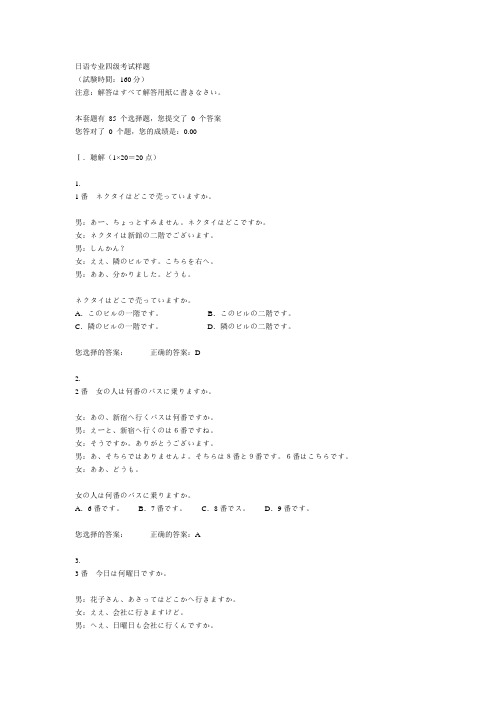
日语专业四级考试样题(試験時間:160分)注意:解答はすべて解答用紙に書きなさい。
本套题有85 个选择题,您提交了0 个答案您答对了0 个题,您的成绩是:0.00Ⅰ.聴解(1×20=20点)1.1番ネクタイはどこで売っていますか。
男:あー、ちょっとすみません。
ネクタイはどこですか。
女:ネクタイは新館の二階でございます。
男:しんかん?女:ええ、隣のビルです。
こちらを右へ。
男:ああ、分かりました。
どうも。
ネクタイはどこで売っていますか。
A.このビルの一階です。
B.このビルの二階です。
C.隣のビルの一階です。
D.隣のビルの二階です。
您选择的答案:正确的答案:D2.2番女の人は何番のバスに乗りますか。
女:あの、新宿へ行くバスは何番ですか。
男:えーと、新宿へ行くのは6番ですね。
女:そうですか。
ありがとうございます。
男:あ、そちらではありませんよ。
そちらは8番と9番です。
6番はこちらです。
女:ああ、どうも。
女の人は何番のバスに乗りますか。
A.6番です。
B.7番です。
C.8番でス。
D.9番です。
您选择的答案:正确的答案:A3.3番今日は何曜日ですか。
男:花子さん、あさってはどこかへ行きますか。
女:ええ、会社に行きますけど。
男:へえ、日曜日も会社に行くんですか。
女:いいえ、あさっては土曜日ですよ。
男:あれ、今日は金曜日でしょう。
女:いいえ、違いますよ。
男:あ、そうか。
今日は何曜日ですか。
A.木曜日です。
B.金曜日です。
C.土曜日です。
D.日曜日です。
您选择的答案:正确的答案:A4.4番男の人は昨日何をしましたか。
女:小林さん、昨日何をしましたか。
男:本を読んでいました。
女:じゃあ、うちにいたんですか。
男:いいえ。
女:あ、じゃあ、図書館?男:いいえ、天気がよかったから公園で。
女:ああ、いいですね。
男の人は昨日何をしましたか。
A.うちにいました。
B.公園で遊びました。
C.図書館に行きました。
D.外で本を読みました。
2008年四级考试(附答案)
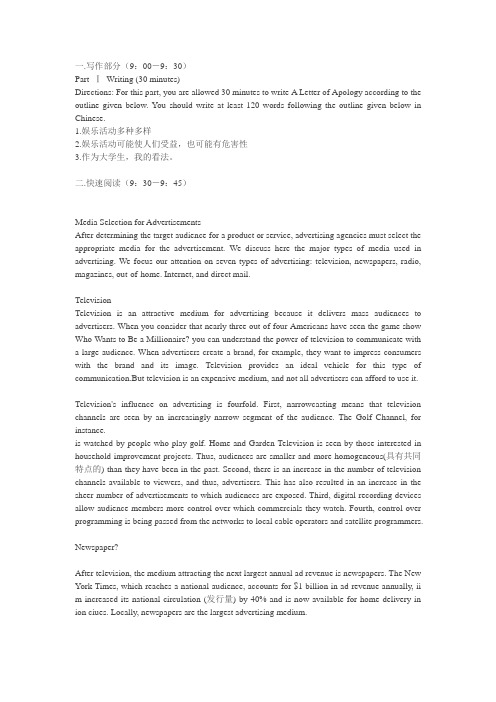
一.写作部分(9:00-9:30)Part ⅠWriting (30 minutes)Directions: For this part, you are allowed 30 minutes to write A Letter of Apology according to the outline given below. You should write at least 120 words following the outline given below in Chinese.1.娱乐活动多种多样2.娱乐活动可能使人们受益,也可能有危害性3.作为大学生,我的看法。
二.快速阅读(9:30-9:45)Media Selection for AdvertisementsAfter determining the target audience for a product or service, advertising agencies must select the appropriate media for the advertisement. We discuss here the major types of media used in advertising. We focus our attention on seven types of advertising: television, newspapers, radio, magazines, out-of-home. Internet, and direct mail.TelevisionTelevision is an attractive medium for advertising because it delivers mass audiences to advertisers. When you consider that nearly three out of four Americans have seen the game show Who Wants to Be a Millionaire? you can understand the power of television to communicate with a large audience. When advertisers create a brand, for example, they want to impress consumers with the brand and its image. Television provides an ideal vehicle for this type of communication.But television is an expensive medium, and not all advertisers can afford to use it.Television's influence on advertising is fourfold. First, narrowcasting means that television channels are seen by an increasingly narrow segment of the audience. The Golf Channel, for instance.is watched by people who play golf. Home and Garden Television is seen by those interested in household improvement projects. Thus, audiences are smaller and more homogeneous(具有共同特点的) than they have been in the past. Second, there is an increase in the number of television channels available to viewers, and thus, advertisers. This has also resulted in an increase in the sheer number of advertisements to which audiences are exposed. Third, digital recording devices allow audience members more control over which commercials they watch. Fourth, control over programming is being passed from the networks to local cable operators and satellite programmers.Newspaper?After television, the medium attracting the next largest annual ad revenue is newspapers. The New York Times, which reaches a national audience, accounts for $1 billion in ad revenue annually, ii m increased its national circulation (发行量) by 40% and is now available for home delivery in ion ciues. Locally, newspapers are the largest advertising medium.Newspapers are a less expensive advertising medium than television and provide a way for advertisers to communicate a longer. more detailed message to their audience than they can through 48 hours,meaning newspapers are also a quick way of getting the massage out.Newspapers are ofen the most important form of news for a local community, and they develop a high degree of loyalty from local reader.RadioAdvertising on radio continues to grow Radio is often used in conjunction with outdoor bill-boards (广告牌) and ihe Internet to reach even more customers than television. Advertisers are likely to use radio because it is a less expensive medium than television, which means advertisers can afford to repeal their ads often. Internet companies are also turning 10 radio advertising. Radio provides a way for advertisers to communicate with audience members at all times of the day.Consumers listen to radio on their way to school or work, at work, on the way home, and in the evening hours.Two major changes—satellite and Internet radio—will force radio advertisers to adapt their methods. Both of these radio forms allow listeners to tune in stations that are more distant than the local stations they could receive in the past. As a result, radio will increasingly attract target audiences who live many miles apart.MagazinesNewsweeklies, w omen’s titles, and business magazines have all seen increases in advertising because they attract the high-end market, magazines are popular with advertisers because of the narrow market that they deliver. A broadcast medium such as network television attracts all types of audience members, but magazine audiences are more homogeneous, if you read sports illustrated, for example, you have much in common with the magazine’s other readers. Advertisers see magazines as an efficient way of reaching target audience members.Advertiser using the print media-magazines and newspapers-will need to adapt to two main changes. First, the internet will bring larger audiences to local newspapers, these second. Advertisers will have to understand how to use an increasing number of magazines for their target audiences. Although some magazines will maintain national audiences, a large number of magazines will entertain narrower audiences.Out-of-home advertisingOut-of-home advertising. Also called place-based advertising, has become an increasingly effective way of reaching consumers, who are more active than ever before. Many consumers today do not sit at home and watch television. Using billboards, newsstands, and bus shelters for advertising is an effective way of reaching these on-the-go consumers. More consumers travel longer distances to and from work, which also makes out-of-home advertising effective, technology has changed the nature of the billboard business, making it a more effective medium than in the past.Using digital printing, billboard companies can print a billboard in 2 hours, compared with 6 days previously. This allows advertisers more variety in the types of messages they create because they.Can change their messages more quickly.InternetAs consumers become more comfortable with online shopping, advertisers will seek to reach this market As consumers get more of their news and information from the Internet, the ability of television and radio to get the word out to consumers will decrease. The challenge to Internet advertisers Is to create ads that audience members remember.Internet advertising will play a more prominent role in organizations' advertising in the near ftuture. Internet audiences tend to be quite homogeneous, but small. Advertisers will have to adjust their methods to reach these audiences and will have to adapt their persuasive strategies to the online medium as well.Direct mailA final advertising medium is direct mail, which uses mailings to consumers to communicate a client's message Direct mail includes newsletters. postcards and special promotions. Direct mail is an effective way to build relationships with consumers.For many businesses.direct mail is the most effective from of advertising.1. Television is an attractive advertising medium in that_____________.A) it has large audiencesB) it appeals to housewivesC) it helps build up a company's reputationD) it is affordable to most advertiser2. With the increase in the number of TV channels_________.A) the cost of TV advertising has decreasedB) the nuiflber of TV viewers has increasedC) advertisers' interest in other media has decreasedD) the number of TV ads people can see has increasedpared with television, newspapers as an advertising medium_________________.A) earn a larger annual ad revenueB) convey more detailed messagesC) use more production techniquesD) get messages out more effectively4.Advertising on radio continues to grow because ___________.A) more local radio stations have been set upB) modern technology makes it more entertainingC) it provides easy access to consumersD) it has been revolutionized by Internet radio.5.Magazines are seen by advertisers as an efficient way to___________.A) reach target audiencesB) modern technology makes it more entertaining C) appeal to educated people.D) convey all kinds of messages6.Oui-of-home advertising has become more effective because_______A) billboards can be replaced within two hoursB) consumers travel more now ever beforeC) such ads have been made much more attractiveD) the pace of urban life is much faster nowadays7. The challenge to Internet advertisers is to create ads that are___________.A) quick to updateB) pleasant to look atC) easy to rememberD) convenient to access8. Internet advertisers will have to adjust their methods to reach audiences that tend to be_____________9.Direct mail is an effecitive form of advertising for businesses to develop_________________________10.This passage discusses how advertisers select________________for advertisements.注意:收答题卡一作文和快速阅读部分(9:45-10:00)三.听力部分(10:00-10:35)Section C注意:此部分试题请在答题卡2上作答。
2008年日语专业四级考试「読解」译文

2008年日语专业四级考试「読解」译文2008年日语专业四级考试「読解」译文Ⅲ.読解四、译文译文:日本气候的特征是四季分明。
据说这种说法常常被外国人指责:别的国家也一样有四个季节,并不只是日本才这么特别。
或许确实如此。
不过,也可以说它只是拿日本与外国进行比较时一定会被用到的一种说辞而已,或者它也可以说已成为日本英语教育中的一种常识性说法。
因此,日本学生在向外国人介绍日本时,一定会在话中的某处加入这句话。
当然,这并不是想特意夸耀日本的气候好。
只是,一旦要向外国介绍日本时,就条件反射性地脱口而出了。
但是,外国人并不想听这种陈词滥调。
他们想听的是——比如一位日本人对日本文化、国际问题的见解,总之是他发自肺腑的真实心声。
然而,日本却几乎没有能让大家学会如此表达的英语教育。
尽管越来越多的人会用英语了,但却难以出现能用英语交流的人。
之所以出现这种情况是因为许多日本人都不知道日本孕育出的本国固有文化。
他们不了解那些值得一提的内容,自然也就讲不出来。
由此看来,问题也不仅限于英语教育。
如今,信息能在世界范围内瞬间互换,地球另一端的国家发生的事情通过报道让人感觉宛如发生在身边。
在这样的时代,特别需要人们能有坦言自己真实想法的勇气和能力。
首先,我们内心要切实拥有值得表述的内容。
此外,需要我们重新思考究竟什么样的英语可以用于与全球各国友好交往,并重新认识日本的英语教育乃至日本人的英语观,这样的时代似乎正在来临。
五、译文【文章1】译文:据以某营养师培训学校的学生为对象进行的调查显示,吃同样的食物,比起一年级学生,二年级中觉得味道较重的学生所占的比例大。
这也许是随着他们对营养学的学习,逐渐也意识到了盐分问题的缘故。
味觉很容易受到生活习惯的影响。
如果家里饮食口味比较重的话就会感觉味道清淡的食物不好吃。
可能在流行辛辣食物的时期,日本人对味道的感觉也变得迟钝过。
所以为了我们的健康,希望(他们)以后能尽量适应清淡的味道,以培养敏锐的味觉。
2008年日语高考(聴解なし)
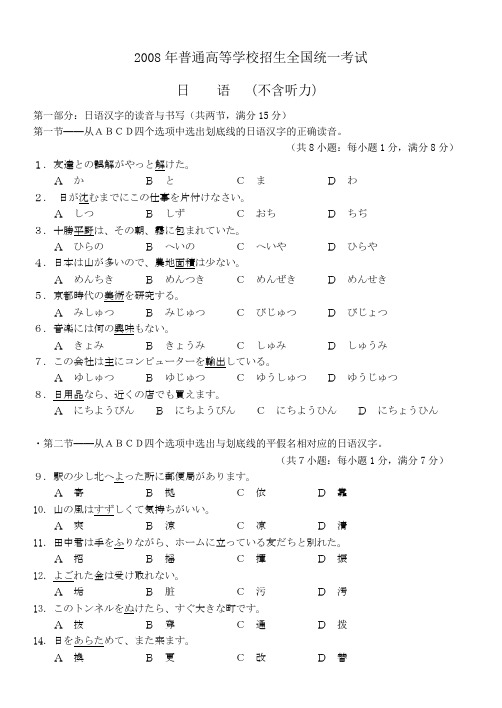
2008年普通高等学校招生全国统一考试日语(不含听力)第一部分:日语汉字的读音与书写(共两节,满分15分)第一节――从ABCD四个选项中选出划底线的日语汉字的正确读音。
(共8小题:每小题1分,满分8分)1.友達との誤解がやっと解けた。
AかBとCまDわ2.日が沈むまでにこの仕事を片付けなさい。
AしつBしずCおちDちぢ3.十勝平野は、その朝、霧に包まれていた。
AひらのBへいのCへいやDひらや4.日本は山が多いので、農地面積は少ない。
AめんちきBめんつきCめんぜきDめんせき5.京都時代の美術を研究する。
AみしゅつBみじゅつCびじゅつDびじょつ6.音楽には何の興味もない。
AきょみBきょうみCしゅみDしゅうみ7.この会社は主にコンピューターを輸出している。
AゆしゅつBゆじゅつCゆうしゅつDゆうじゅつ8.日用品なら、近くの店でも買えます。
AにちようびんBにちようぴんCにちようひんDにちょうひん・第二节――从ABCD四个选项中选出与划底线的平假名相对应的日语汉字。
(共7小题:每小题1分,满分7分)9.駅の少し北へよった所に郵便局があります。
A寄B拠C依D靠10.山の風はすずしくて気持ちがいい。
A爽B涼C凉D清11.田中君は手をふりながら、ホームに立っている友だちと別れた。
A招B揺C揮D振12.よごれた金は受け取れない。
A垢B脏C污D汚13.このトンネルをぬけたら、すぐ大きな町です。
A抜B穿C通D拨14.日をあらためて、また来ます。
A換B更C改D替15.子どもはあまりえんりょしない。
A遠虑B远虑C远遠D遠慮第二部分:日语知识运用――从每小题给出的四个选项中,选出一个最佳选项。
(共45小题:每小题1分,满分45分)16.李さんは人前___緊張しがちです。
AにBでCへDが17.かれは成功の第一歩を踏み出した。
AとBでCにDへ18.かれは有名な俳優で毎日テレビ出ています。
AをBにCでDから19.日本のアパートの狭さびっくりしてしまった。
2008年JLPT四级题和答案
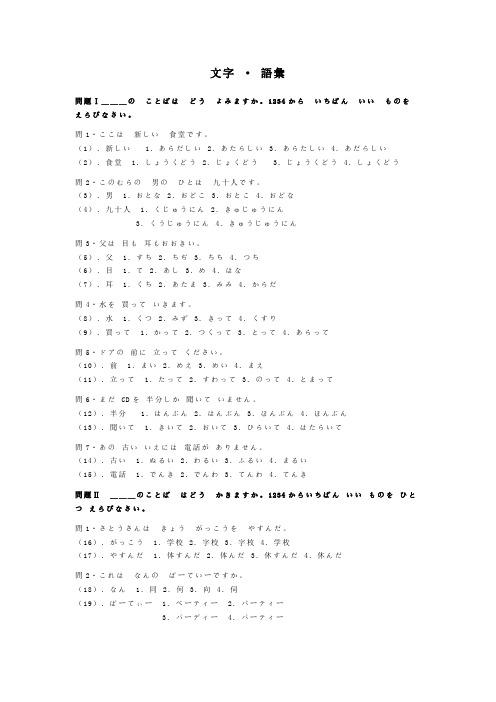
文字· 語彙問題Ⅰ___のことばはどうよみますか。
1234からいちばんいいものをえらびなさい。
問1・ここは新しい食堂です。
(1).新しい1.あらだしい2.あたらしい3.あらたしい4.あだらしい(2).食堂1.しょうくどう2.じょくどう3.じょうくどう4.しょくどう問2・このむらの男のひとは九十人です。
(3).男1.おとな2.おどこ3.おとこ4.おどな(4).九十人1.くじゅうにん2.きゅじゅうにん3.くうじゅうにん4.きゅうじゅうにん問3・父は目も耳もおおきい。
(5).父1.すち2.ちぢ3.ちち4.つち(6).目1.て2.あし3.め4.はな(7).耳1.くち2.あたま3.みみ4.からだ問4・水を買っていきます。
(8).水1.くつ2.みず3.きって4.くすり(9).買って1.かって2.つくって3.とって4.あらって問5・ドアの前に立ってください。
(10).前1.まい2.めえ3.めい4.まえ(11).立って1.たって2.すわって3.のって4.とまって問6・まだCDを半分しか聞いていません。
(12).半分1.はんぷん2.はんぶん3.ほんぶん4.ほんぷん(13).聞いて1.きいて2.おいて3.ひらいて4.はたらいて問7・あの古いいえには電話がありません。
(14).古い1.ぬるい2.わるい3.ふるい4.まるい(15).電話1.でんき2.でんわ3.てんわ4.てんき問題Ⅱ___のことばはどうかきますか。
1234からいちばんいいものをひとつえらびなさい。
問1・さとうさんはきょうがっこうをやすんだ。
(16).がっこう1.学校2.字校3.字枚4.学枚(17).やすんだ1.体すんだ2.体んだ3.休すんだ4.休んだ問2・これはなんのばーていーですか。
(18).なん1.同2.何3.向4.伺(19).ぱーてぃー1.ベーティー2.バーティー3.パーディー4.パーティー問3・あめがふっていますからいきません。
(20).あめ1.冊2.両3.雨4.再(21).いきません1.行きません2.仕きません3.代きません4.征きません問4・わたしのかいしゃはあのビルのなかです。
专四08年完型与阅读部分真题及答案
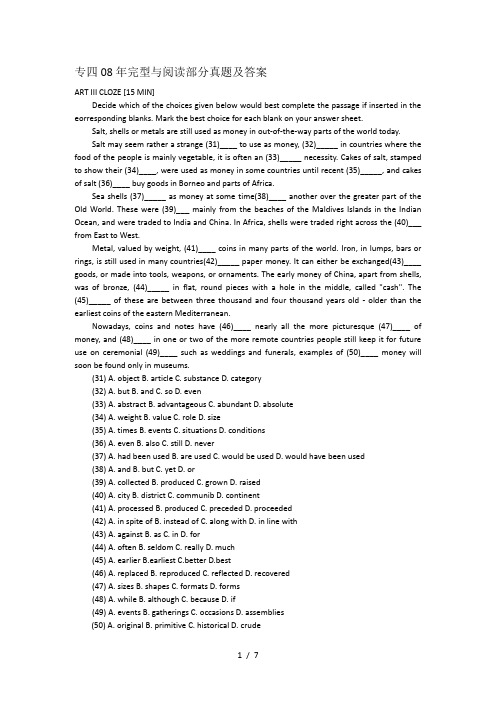
专四08年完型与阅读部分真题及答案ART III CLOZE [15 MIN]Decide which of the choices given below would best complete the passage if inserted in the eorresponding blanks. Mark the best choice for each blank on your answer sheet.Salt, shells or metals are still used as money in out-of-the-way parts of the world today.Salt may seem rather a strange (31)____ to use as money, (32)_____ in countries where the food of the people is mainly vegetable, it is often an (33)_____ necessity. Cakes of salt, stamped to show their (34)____, were used as money in some countries until recent (35)_____, and cakes of salt (36)____ buy goods in Borneo and parts of Africa.Sea shells (37)_____ as money at some time(38)____ another over the greater part of the Old World. These were (39)___ mainly from the beaches of the Maldives Islands in the Indian Ocean, and were traded to India and China. In Africa, shells were traded right across the (40)___ from East to West.Metal, valued by weight, (41)____ coins in many parts of the world. Iron, in lumps, bars or rings, is still used in many countries(42)_____ paper money. It can either be exchanged(43)____ goods, or made into tools, weapons, or ornaments. The early money of China, apart from shells, was of bronze, (44)_____ in flat, round pieces with a hole in the middle, called "cash". The (45)_____ of these are between three thousand and four thousand years old - older than the earliest coins of the eastern Mediterranean.Nowadays, coins and notes have (46)____ nearly all the more picturesque (47)____ of money, and (48)____ in one or two of the more remote countries people still keep it for future use on ceremonial (49)____ such as weddings and funerals, examples of (50)____ money will soon be found only in museums.(31) A. object B. article C. substance D. category(32) A. but B. and C. so D. even(33) A. abstract B. advantageous C. abundant D. absolute(34) A. weight B. value C. role D. size(35) A. times B. events C. situations D. conditions(36) A. even B. also C. still D. never(37) A. had been used B. are used C. would be used D. would have been used(38) A. and B. but C. yet D. or(39) A. collected B. produced C. grown D. raised(40) A. city B. district C. communib D. continent(41) A. processed B. produced C. preceded D. proceeded(42) A. in spite of B. instead of C. along with D. in line with(43) A. against B. as C. in D. for(44) A. often B. seldom C. really D. much(45) A. earlier B.earliest C.better D.best(46) A. replaced B. reproduced C. reflected D. recovered(47) A. sizes B. shapes C. formats D. forms(48) A. while B. although C. because D. if(49) A. events B. gatherings C. occasions D. assemblies(50) A. original B. primitive C. historical D. crudePART V READING COMPREHENSION [25 MIN]In this section there are four passages followed by questions or unfinished statements, each with four suggested answers marked A, B, C and D. Choose the one that you think is the best answer. Mark your answers on your answer sheet.TEXT AWhen the sun is up in Amsterdam, the largest city in the Netherlands sits quietly on theAmstel River. You can rent a bicycle, visit the Van Gogh or Anne Frank museum, or take a water taxi.But when the sun goes down, the partying begins. In the big clubs and in coffee shops,tourists gather to hang out, talk politics and smoke.Several areas of the city clearly show the two worlds that rule Amsterdam. And they're allwithin a short cab ride of each other.For example, Dam Square attracts daytime sightseers to its festivals, open markets, concerts and other events. Several beautiful and very popular hotels can be found there. And there is the Royal Palace and the Magna Plaza shopping mall.But as evening descends on Dam Square so do the party-seekers. Hip pop or funk music begins blaring from Club Paradiso and Club Melkweg. These are two of the most popular clubs in Europe. So if you come, be ready to dance. The clubs don't shut down until 4 am.And while you are there, check out the various inexpensive ways to tour the city. Don't worry about getting lost. Although Dutch is the official language, most people in Amsterdam speak English and are happy to help you with directions.And you'll notice that half the people in the streets are on bicycles. They rent for US$17 to $20 for a whole day.Amsterdam also has a good canal system. From anywhere between U852 and $9.50, you can use the canal bus or a water taxi to cruise the "Venice of the North".You can take in the picturesque canal house architecture: The rows of neat, narrow four-story dwellings of brownstone with large windows are well worth seeing. Many of them are several centuries old.You might also want to jump out of the canal bus at the Museum Quarter and start walking. Masterpieces by Dutch artists such as Rembrandt, Bruegel, Van Gogh and others are on display at the Van Gogh Museum, Rembrandt House and others.The city has an appreciation of its historic past. One place to visit is the Anne Frank House in Nine Streets. It was there that the young Jewish girl wrote her famous diary during World War II. Visitors can view Anne's original diary and climb behind the bookcase to the room where she and her family hid from the Nazis for two years.81. At the beginning of the passage, the author indicates thatA. Amsterdam is generally known as a quiet city.B. parties go on all day long in Amsterdam,C. Amsterdam presents two different pictures.D. Amsterdam attracts many daytime visitors.82. Which tourist attraction is cited for elaboration in Paragraphs Four and Five?A. Royal Palace.B. Dam Square.C. Club Paradiso.D. Magna Plaza.83. According to the passage, the local people have all the following characteristics EXCEPTA. they are party goers.B. they show hospitality.C. they can speak English.D. they are fond of cycling.84. Which of the following adjectives can best describe Amsterdam as a tourist city?A. Modern.B. Delightful.C. Quiet.D. Historic.TEXT BIn an article some Chinese scholars are described as being "tantalized by the mysteriousdragon bone hieroglyphics." Tantalized is one of many English words that have their origins in myths and legends of the past (in this case, Greek and Roman ones). The meaning of the verb tantalize is a very particular one: "to promise or show something desirable to a person and then take it away; to tease by arousing hope." Many (but not all) English dictionaries give you a brief indication of a word's origins in brackets before or after the explanation of the meaning. For tantalize the following explanation is given: [> Tantalus]. This means that you should look up the name Tantalus to find out the word's origins, and if you do, you will find out that in Greek mythology, Tantalus was a king who was punished in the lower world with eternal hunger and thirst; he was put up to his chin in water that always moved away when he tried to drink it and with fruit on branches above him placed just a little bit out of his reach. Can you see why his name was changed into a verb meaning "to tease or torment by arousing desire"?Another example is the word siren, familiar to us as the mechanical device that makes such an alarming sound when police cars, ambulances, or fire engines approach. This word also has its origins in Greek mythology. The traveler Odysseus (Ulysses to the Romans) made his men plug their ears so that they wouldn't hear the dangerous voices of the sirens, creatures who were half bird and half woman and who lured sailors to their deaths on sharp rocks. So the word came to be associated both with a loud sound and with danger!When someone speaks of a "jovial mood" or a "herculean effort," he or she is using words with origins in mythology. Look these words up to find their meaning and relationship to myths.Many common words, such as the names for the days of the week and the months of the year, also come from mythology. Wednesday derives from the ancient Norse king of the gods, Woden, and Thursday was originally Thor's day, in honour of Thor, the god of thunder. As a matter of fact, all the planets, except the one we live on, bear names that come from Roman mythology,including the planet that is farthest away from the sun and for that reason was called after the Roman god of the dead. This god has also given his name to one of the chemical elements.Several other elements have names that come from mythology, too.It seems that myths and legends live on in the English language85. The purpose of the first sentence in Paragraph One is ____.A. to describe the work of some Chinese scholars.B. to arouse readers' interest in hieroglyphics.C. to lead readers onto the main theme.D. to link the preceding part to the present one.86. We learn from the passage, all English dictionaries include _____.A. legends.B. mythology.C. word origins.D. word definitions.87. The example of tantalize is to show _____.A. how the word came into existence.B. how Tantalus was punished in the lower world.C. how all English dictionaries show word origins.D. how the meaning of the word changed over the years.88. According to the passage, which of the following does NOT have origins in myths orlegends?A. Jovial.B. Wednesday.C. Earth.D. March.89. Which of the following can best serve as the title of the passage?A. Greek and Roman Mythology in Language.B. Mythological Origins of English Words.C. Historical Changes in Word Meanings.D. Mythology and Common Words.TEXT CMy heart sank when the man at the immigration counter gestured to the back room. l'm an American born and raised, and this was Miami, where I live, but they weren't quite ready to let me in yet."Please wait in here, Ms Abujaber," the immigration officer said. My husband, with his very American last name, accompanied me. He was getting used to this. The same thing had happened recently in Canada when I'd flown to Montreal to speak at a book event. That time they held me for 45 minutes. Today we were returning from a literary festival in Jamaica, and I was startled that I was being sent "in back" once again.The officer behind the counter called me up and said, "Miss, your name looks like the name of someone who's on our wanted list. We're going to have to check you out with Washington.""How long will it take?""Hard to say ... a few minutes," he said. "We'll call you when we're ready for you." After an hour, Washington still hadn't decided anything about me. "Isn't this computerized?"I asked at the counter. "Can't you just look me up?"Just a few more minutes, they assured me.After an hour and a half, I pulled my cell phone out to call the friends I was supposed to meet that evening. An officer rushed over. "No phones!" he said. "For all we know you could be calling a terrorist cell and giving them information.""I'm just a university professor," I said. My voice came out in a squeak."Of course you are. And we take people like you out of here in leg irons every day."I put my phone away.My husband and 1 were getting hungry and tired. Whole families had been brought into the waiting room, and the place was packed with excitable children, exhausted parents, even a flight attendant.I wanted to scream, to jump on a chair and shout: "I'm an American citizen; a novelist; lprobably teach English literature to your children." Or would that all be counted against me?After two hours in detention, I was approached by one of the officers. "You're free to go," he said. No explanation or apologies. For a moment, neither of us moved, we were still in shock.Then we leaped to our feet."Oh, one more thing." He handed me a tattered photocopy with an address on it. "If you weren't happy with your treatment, you can write to this agency.""Will they respond?" I asked."I don't know --- I don't know of anyone who's ever written to them before." Then he added,"By the way, this will probably keep happening each time you travel internationally.""What can I do to keep it from happening again?"He smiled the empty smile we'd seen all day. "Absolutely nothing."After telling several friends about our ordeal, probably the most frequent advice I've heard in response is to change my name. Twenty years ago, my own graduate school writing professor advised me to write under a pen name so that publishers wouldn't stick me in what he called "the ethnic ghetto" --- a separate, secondary shelf in the bookstore. But a name is an integral part of anyone's personal and professional identity -just like the town you're born in and the place where you're raised.Like my father, I'll keep the name, but my airport experience has given me a whole new perspective on what diversity and tolerance are supposed to mean. I had no idea that being an American would ever be this hard.90. The author was held at the airport because _____.A. she and her husband returned from Jamaica.B. her name was similar to a terrorist's.C. she had been held in Montreal.D. she had spoken at a book event.91. She was not allowed to call her friends because _____.A. her identity hadn't been confirmed yet.B. she had been held for only one hour and a half.C. there were other families in the waiting room.D. she couldn't use her own cell phone.92. We learn from the passage that the author would _____ to prevent similar experiencefrom happening again.A. write to the agencyB. change her nameC. avoid traveling abroadD. do nothing93. Her experiences indicate that there still exists _____ in the US.A. hatredB. discriminationC. toleranceD. diversity94. The author sounds in the last paragraph.A. impatientB. bitterC. worriedD. ironicTEXT DPublic speaking fills most people with dread. Humiliation is the greatest fear; self-exposure andfailing to appeal to the audience come a close second. Women hate it most, since girls are pressurized from an early age to be concerned with appearances of all kinds.Most people have plenty of insecurities, and this seems like a situation that will bring them out. If you were under pressure to be perfect, you are terrified of falling in the most public of ways. While extroverts will feel less fear before the ordeal, it does not mean they will necessarily do it better. Some very shy people manage to shine. When I met the British comedian Julian Clary, he was shy and cautious, yet his TV performances are perfect.In fact, personality is not the best predictor of who does it well. Regardless of what you are like in real life, the key seems to be to act yourself.Actual acting, as in performing the scripted lines of a character other than yourself, does not do the job. While politicians may limit damage by having carefully rehearsed, written scripts to speak from, there is always a hidden awareness among the audience that the words might not be true.Likewise, the incredibly perfect speeches of many American academics are far from natural.You may end up buying their book on the way out, but soon afterwards, it is much like fast food, and you get a nameless sense that you've been cheated.Although, as Earl Spencer proved at his sister Princess Diana's funeral, it is possible both to prepare every word and to act naturally. A script rarely works and it is used to help most speakers.But, being yourself doesn't work either. If you spoke as if you were in your own kitchen, itwould be too authentic, too unaware of the need to communicate with an audience.I remember going to see British psychiatrist R. D. Laing speak in public. He behaved like a seriously odd person, talking off the top of his head. Although he was talking about madness and he wrote on mental illness, he seemed to be exhibiting rather than explaining it.The best psychological place from which to speak is an unselfconscious self-consciousness, providing the illusion of being natural. Studies suggest that this state of "flow", as psychologists call it, is very satisfying.95. Women hate public speaking most mainly because of _____.A. their upbringing very early on.B. their inability to appeal to the audience.C. their sense of greater public pressure.D. their sense of greater humiliation.96. "this" in Paragraph Two refers toA. insecurity.B. sense of failure.C. public speaking.D. pressure.97. Which of the following is NOT the author's viewpoint?A. Acting like performers spoils the message in a speech.B. Perfection of scripts is necessary in making good impressions.C. Acting naturally means less dependence on the prepared script.D. There should be a balance between actual acting and acting naturally.98. What is the author's view on personality?A. Personality is the key to success in public speaking.B. Extroverts are better public speakers.C. Introverts have to learn harder to be good speakers.D. Factors other than personality ensure better performance.99. The author implies that while speaking R. D. Laing _____.A. was both too casual and authentic.B. was acting like a performer.C. was keeping a good balance.D. was aware of his audience.100. In the last paragraph the author recommends that ____.A. you forget about your nervousness.B. you feel natural and speak naturally.C. you may feel nervous, but appear naturally.D. you may imagine yourself to be naturalPART III CLOZE31-35 CADBA 36-40 CADAD 41-45 CBDAB 46-50 ADBCBPART IV GRAMMAR & VOCABULARY51-55 DBDCB 56-60 CDCDB 61-65 ACDAB 66-70 DCADB[文档可能无法思考全面,请浏览后下载,另外祝您生活愉快,工作顺利,万事如意!]。
2008年专四真题答案
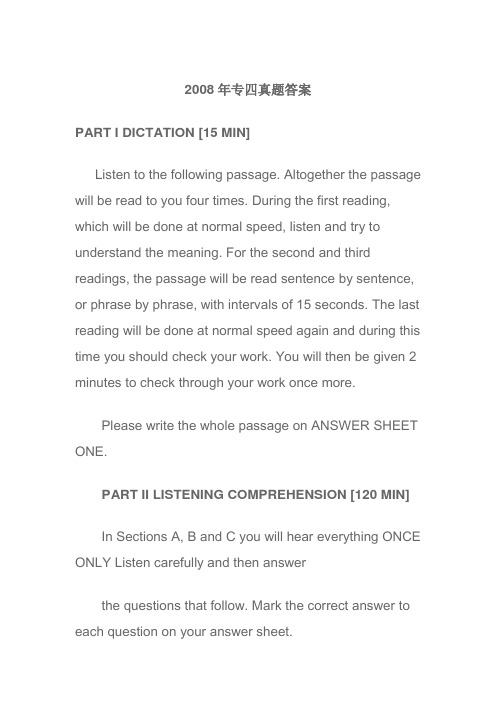
2008年专四真题答案PART I DICTATION [15 MIN]Listen to the following passage. Altogether the passage will be read to you four times. During the first reading, which will be done at normal speed, listen and try to understand the meaning. For the second and third readings, the passage will be read sentence by sentence, or phrase by phrase, with intervals of 15 seconds. The last reading will be done at normal speed again and during this time you should check your work. You will then be given 2 minutes to check through your work once more.Please write the whole passage on ANSWER SHEET ONE.PART II LISTENING COMPREHENSION [120 MIN]In Sections A, B and C you will hear everything ONCE ONLY Listen carefully and then answerthe questions that follow. Mark the correct answer to each question on your answer sheet.SECTION A CONVERSATIONSIn this section you will hear several conversations. Listen to the conversations carefully and then answer the questions that follow.Questions 1 to 3 are based on the.following conversation. At the end of the conversation, you will be given 15 seconds to answer the questions. Now listen to the conversation.1. When is Anne available for the meeting?A. The third week of May.B. The third week of June.C. The eleventh of June.D. The eleventh of May.2. Their meeting will probably take place inA. London.B. Toronto.C. Mexico City.D. Chicago.3. When is Eric calling back?A. Thursday afternoon.B. Friday afternoon.C. Thursday morning.D. Friday morning.Questions 4 to 6 are based on the following conversation. At the end of the conversation, you will be given 15 seconds to answer the questions. Now, listen to the conversation.4. According to the woman, advertisementsA. let us know the best product.B. give us sufficient information.C. fail to convince people.D. give misleading information.5. In the woman's opinion, money spent on advertisements is paidA. by manufacturers.B. by customers.C. by advertisers.D. by all of them.6. Which of the following statements is INCORRECT?.A. The woman seems to be negative about advertising.B. The woman appears to know more about advertising.C. The man is to be present at a debate on advertising.D. The man has a lot to talk about on advertising.Questions 7 to 10 are based on the following conversation. At the end of the conversation,you will be given 20 seconds to answer the questions. Now, listen to the conversation.7. Mr Brown brought with him only a few things becauseA. there wasn't enough space in the cupboard.B. the hospital would provide him with everything.C. he was to stay there for a very short time.D. visitors could bring him other things.8. According to the hospital rules, at which of the following hours can visitors see patients?A. 2:00 pm.B. 5:00 pm.C. 7:00 pm.D. 6:00 pm.9. Which of the following statements is INCORRECT?A. Patients have breakfast at 8.B. Patients have lunch at 12.C. There are special alcohol lounges.D. There are special smoking lounges.10. Which statement best describes Mr Brown?A. He knows little about hospital rules.B. He can keep alcohol in the ward.C. He knows when to smoke.D. He is used to hospital life.SECTION B PASSAGESIn this section, you will hear several passages. Listen to the passages carefully and thenanswer the questions that follow.Questions 11 to 13 are based on the following passage. At the end of the passage, you will be given 15 seconds to answer the questions. Now, listen to the passage.11. Meeting rooms of various sizes are needed forA. contacts with headquarters.B. relaxation and enjoyment.C. informal talks.D. different purposes.12. Which of the following is NOT mentioned in the passage as part of hotel facilities forguests?A. Restaurants.B. Cinemas.C. Swimming pools.D. Bars.13. A hotel for an international conference should have the following EXCEPTA. convenient transport services.B. competent office secretaries.C. good sports and restaurant facilities.D. suitable and comfortable rooms.Questions 14 to 17 are based on the following passage. At the end of the passage, you will be given 20 seconds to answer the questions. Now, listen to the passage.14. The museum aims mainly to displayA. the area's technological development.B. the nation's important historical events.C. the area's agricultural and industrial development.D. the nation's agricultural and industrial development.15. The following have been significant in the area's prosperity EXCEPTA. the motorways.B. the Roman road.C. the canals.D. the railways.16. We know from the passage that some exhibitsA. are borrowed from workshops.B. are specially made for display.C. reflect the local culture and customs.D. try to reproduce the scene at that time.17. The passage probably comes fromA. a conversation on the museum.B. a museum tour guide.C. a museum booklet.D. a museum advertisement.Questions 18 to 20 are based on the following passage. At the end of the passage, you will be given 15 seconds to answer the questions. Now, listen to the passage.18. According to the speaker, safety in dormitory means that youA. insure all your expensive things.B. lock doors when going out.C. lock windows at night.D. take all necessary precautions.19. What does the speaker suggest girls do when they are going to be out late?A. Call their friends.B. Stay with their friends.C. Avoid walking in streets.D. Always take a taxi.20. What is the speaker's last advice?A. To take a few self-defense classes.B. To stick to well-lit streets at night.C. To avoid walking alone at night.D. To stay with their friends.SECTION C NEWS BROADCASTIn this section, you will hear several news items. Listen to them carefully and then answer the questions that follow.Questions 21 and 22 are based on the following news. At the end of the news item, you will be given 10 seconds to answer the questions. Now. listen to the news.21. What happened during the New Year celebration in Thailand?A. Terrorists fought with Government troops.B. Thai troops killed terrorists.C. There were shootings.D. There were explosions.22. What has led to the violent situation in the south of Thailand?A. The Muslims wanted independence.B. Thai troops have been sent there.C. About 2000 people have been killed.D. There have been more bombings since 2004.Questions 23 and 24 are based on the following news. At the end of the news item, you will be given 10 seconds to answer the questions. Now, listen to the news.23. Under the national oil law, the Iraqi governmentA. will give more oil revenues to only a few provinces.B. will let provinces distribute their oil revenues.C. will distribute oil revenues according to population size.D. will distribute oil revenues according to security needs.24. The construction package is meant toA. help build more houses.B. help improve the country's economy.C. help more children to go to school.D. help more young people to get education.Questions 25 and 26 are based on the following news. At the end of the news item, you will be given 10 seconds to answer the questions. Now, listen to the news.25. The joint committee will promote co-operation between Egypt and Spain in all the followingareas EXCEPTA. education.B. industry.C. investment.D. technology.26. What is this news item mainly about?A. The establishment of a joint committee.B. The trade relations between Egypt and Spain.C. The future trade volume between Egypt and Spain.D. The establishment of a joint business council.Question 27 is based on the following news. At the end of the news item, you will be given 5seconds to answer the question. Now, listen to the news.27. According to the news, Japanese teenage womenA. are less violent than men.B. are less violent than before.C. are more violent than before.D. are more violent than men.Question 28 is based on the following news. At the end of the news item, you will be given 5seconds to answer the question. Now, listen to the news.28. Which of the following statements is CORRECT according to the news?A. Zimbabweans stayed away from voting.B. Zimbabweans were enthusiastic about voting.C. Only a few Zimbabweans turned up to vote.D. Zimbabweans believed that Mugabe would win.Questions 29 and 30 are based on the following news. At the end of the news item, you will be given 10 seconds to answer the questions. Now, listen to the news.29. The news mentioned _____ reason(s) for the action taken by Indian telecom workers.A. 1B. 2C. 3D. 430. According to the news, who among the following were NOT affected by telecom workers' action?A. Banks.B. Big companies.C. Long-distance callers.D. Government officials.PART III CLOZE [15 MIN]Decide which of the choices given below would best complete the passage if inserted in the eorresponding blanks. Mark the best choice for each blank on your answer sheet.Salt, shells or metals are still used as money inout-of-the-way parts of the world today.Salt may seem rather a strange (31)____ to use as money, (32)_____ in countries where the food of the people is mainly vegetable, it is often an (33)_____ necessity. Cakes of salt, stamped to show their (34)____, were used as money in some countries until recent(35)_____, and cakes of salt (36)____ buy goods in Borneo and parts of Africa.Sea shells (37)_____ as money at some time(38)____ another over the greater part of the Old World. These were (39)___ mainly from the beaches of the Maldives Islands in the Indian Ocean, and were traded to India and China. In Africa, shells were traded right across the (40)___ from East to West.Metal, valued by weight, (41)____ coins in many parts of the world. Iron, in lumps, bars or rings, is still used in many countries(42)_____ paper money. It can either be exchanged(43)____ goods, or made into tools, weapons, or ornaments. The early money of China, apart from shells, was of bronze, (44)_____ in flat, round pieces with a hole in the middle, called "cash". The (45)_____ of these are between three thousand and four thousand years old - older than the earliest coins of the eastern Mediterranean.Nowadays, coins and notes have (46)____ nearly all the more picturesque (47)____ of money, and (48)____ in one or two of the more remote countries people still keep itfor future use on ceremonial (49)____ such as weddings and funerals, examples of (50)____ money will soon be found only in museums.(31) A. object B. article C. substance D. category(32) A. but B. and C. so D. even(33) A. abstract B. advantageous C. abundant D. absolute(34) A. weight B. value C. role D. size(35) A. times B. events C. situations D. conditions(36) A. even B. also C. still D. never(37) A. had been used B. are used C. would be usedD. would have been used(38) A. and B. but C. yet D. or(39) A. collected B. produced C. grown D. raised(40) A. city B. district C. communib D. continent(41) A. processed B. produced C. preceded D. proceeded(42) A. in spite of B. instead of C. along with D. in line with(43) A. against B. as C. in D. for(44) A. often B. seldom C. really D. much(45) A. earlier B.earliest C.better D.best(46) A. replaced B. reproduced C. reflected D. recovered(47) A. sizes B. shapes C. formats D. forms(48) A. while B. although C. because D. if(49) A. events B. gatherings C. occasions D. assemblies(50) A. original B. primitive C. historical D. crudePART IV GRAMMAR & VOCABULARY [15 MIN]There are thirty sentences in this section. Beneath each sentence there are four words or phrase marked A, B, C and D. Choose one word orphrase that best completes the sentence. Mark your answers on your answer sheet.51. Our association, which has consistently pressed for greater employment opportunities for tN disabled, will publish ____ proposals in the near future.A. theirB. ourC. hisD. its52. Had Judy been more careful on the maths exam, she ____ much better results now.A. would be gettingB. could have gotC. must getD. would get53. Nine is to three _____ three is to one.A. whenB. thatC. whichD. what54. Men differ from animals ____ they can think and speak.A. for whichB. for thatC. in thatD. in which55. ____ he wanted to go out with his friends at the weekend, he had to stay behind to finish his assignment.A. Much thoughB. Much asC. As muchD. Though much56. I enjoyed myself so much ____ I visited my friends in Paris last year.A. whenB. whichC. thatD. where57. Which of the following is INCORRECT?A. All his lectures were boring. C. Her few friends are all fond of dancing.B. Half his money was gone. D. He invited many his friends to the party.58. When you have finished with that book, don't forget to put it back on my desk, _____?A. do youB. don't youC. will youD. won't you59. What does "He wisely refused to spend his money" mean?A. It was wise of him to refuse to spend his money.B. He refused to spend his money in a wise manner.C. He was short of money and didn't want to buy anything.D. He refused, in a wise manner, to spend his money.60. They stood chatting together as easily and naturally as ____.A. it could beB. could beC. it wasD. was61. The following are all correct responses to "Who told the news to the teacher?" EXCEPTA. Jim did this.B. Jim did so.C. Jim did that.D. Jim did.62. Quality is ____ counts most.A. whichB. thatC. whatD. where63. In his plays Shakespeare _____ his characters live through their language.A. would makeB. had madeC. madeD. makes64. The square itself is five hundred yards wide, five times ____ the size of St. Peter's in Rome.A. /B. that ofC. which isD. of65. Which of the following sentences expresses "probability"?A. You must leave immediately.B. You must be feeling rather tired.C. You must be here by eight o'clock.D. You must complete the reading assignment on time.66. When he first started in university, he really felt at _____ with his major --- economics.A. shoreB. bankC. oceanD. sea67. On the road motorists should be aware of cyclists and be ____ towards them.A. considerableB. consideringC. considerateD. considered68. Sally was a bit shy, but the teacher found her quite ____ discussing a recent film with others.A. at homeB. at mostC. at houseD. at bean69. The company has capitalized _____ the error of judgment made by its business competitor.A. inB. overC. withD. on70. Tim has failed three courses this semester, so he will have to _____ them next semester.A. remakeB. repeatC. reapplyD. revise71. Keep this reference book; it may come in _____ one day.A. handyB. usefulC. convenientD. helpful72. The questions that the speaker raised were well ____ the average adult.A. pastB. onC. beyondD. through73. Teachers in this school were encouraged to use drama as a(n) _____ of learning.A. designB. instrumentC. agencyD. tool74. First, we need to find out what his scheme is, and then act _____.A. sensitivelyB. imaginativelyC. efficientlyD. accordingly75. At first Jim was not quite clear what he was going to do after university, but now he seems_____ on becoming a computer programmer.A. fitB. setC. disposedD. decided76. When invited to talk about his achievements+ he refused to blow his own _____ anddeclined to speak at the meeting.A. trumpetB. whistleC. bugleD. flute77. In spite of the treatment, the pain in his leg grew inA. gravityB. extentC. intensityD. amount78. Bus services between Town Centre and Newton Housing Estate will be _____ until themotorway is repaired.A. discontinuedB. suspendedC. haltedD. ceased79. The moon, being much nearer to the Earth than the Sun, is the ____ cause of the tides.A. principalB. basicC. initialD. elementary80. Teddy came to my ____ with a cheque of $200 to pay my room rate, after I phoned himthat my wallet had been stolen.A. attendanceB. assistanceC. rescueD. safetyPART V READING COMPREHENSION [25 MIN]In this section there are four passages followed by questions or unfinished statements, each with four suggested answers marked A, B, C and D. Choose the one that you think is the best answer. Mark your answers on your answer sheet.TEXT AWhen the sun is up in Amsterdam, the largest city in the Netherlands sits quietly on theAmstel River. You can rent a bicycle, visit the Van Gogh or Anne Frank museum, or take a water taxi.But when the sun goes down, the partying begins. In the big clubs and in coffee shops,tourists gather to hang out, talk politics and smoke.Several areas of the city clearly show the two worlds that rule Amsterdam. And they're allwithin a short cab ride of each other.For example, Dam Square attracts daytime sightseers to its festivals, open markets, concerts and other events. Several beautiful and very popular hotels can be found there. And there is the Royal Palace and the Magna Plaza shopping mall.But as evening descends on Dam Square so do the party-seekers. Hip pop or funk music begins blaring from Club Paradiso and Club Melkweg. These are two of the most popular clubs in Europe. So if you come, be ready to dance. The clubs don't shut down until 4 am.And while you are there, check out the various inexpensive ways to tour the city. Don't worry about getting lost. Although Dutch is the official language, most people in Amsterdam speak English and are happy to help you with directions.And you'll notice that half the people in the streets are on bicycles. They rent for US$17 to $20 for a whole day.Amsterdam also has a good canal system. From anywhere between U852 and $9.50, you can use the canal bus or a water taxi to cruise the "Venice of the North".You can take in the picturesque canal house architecture: The rows of neat, narrow four-story dwellings of brownstone with large windows are well worth seeing. Many of them are several centuries old.You might also want to jump out of the canal bus at the Museum Quarter and start walking. Masterpieces by Dutch artists such as Rembrandt, Bruegel, Van Gogh and others are on display at the Van Gogh Museum, Rembrandt House and others.The city has an appreciation of its historic past. One place to visit is the Anne Frank House in Nine Streets. It was there that the young Jewish girl wrote her famous diary during World War II. Visitors can view Anne's original diary and climb behind the bookcase to the room where she and her family hid from the Nazis for two years.81. At the beginning of the passage, the author indicates thatA. Amsterdam is generally known as a quiet city.B. parties go on all day long in Amsterdam,C. Amsterdam presents two different pictures.D. Amsterdam attracts many daytime visitors.82. Which tourist attraction is cited for elaboration in Paragraphs Four and Five?A. Royal Palace.B. Dam Square.C. Club Paradiso.D. Magna Plaza.83. According to the passage, the local people have all the following characteristics EXCEPTA. they are party goers.B. they show hospitality.C. they can speak English.D. they are fond of cycling.84. Which of the following adjectives can best describe Amsterdam as a tourist city?A. Modern.B. Delightful.C. Quiet.D. Historic.TEXT BIn an article some Chinese scholars are described as being "tantalized by the mysteriousdragon bone hieroglyphics." Tantalized is one of many English words that have their origins in myths and legends of the past (in this case, Greek and Roman ones). The meaning of the verb tantalize is a very particular one: "to promise or show something desirable to a person and then take it away; to tease by arousing hope." Many (but not all) English dictionaries give you a brief indication of a word's origins in brackets before or after the explanation of the meaning. For tantalize the following explanation is given: [> Tantalus]. This means that you should look up the name Tantalus to find out the word's origins, and if you do, you will find out that in Greek mythology, Tantalus was a kingwho was punished in the lower world with eternal hunger and thirst; he was put up to his chin in water that always moved away when he tried to drink it and with fruit on branches above him placed just a little bit out of his reach. Can you see why his name was changed into a verb meaning "to tease or torment by arousing desire"?Another example is the word siren, familiar to us as the mechanical device that makes suchan alarming sound when police cars, ambulances, or fire engines approach. This word also has its origins in Greek mythology. The traveler Odysseus (Ulysses to the Romans) made his men plug their ears so that they wouldn't hear the dangerous voices of the sirens, creatures who were half bird and half woman and who lured sailors to their deaths on sharp rocks. So the word came to be associated both with a loud sound and with danger!When someone speaks of a "jovial mood" or a "herculean effort," he or she is using words with origins in mythology. Look these words up to find their meaning and relationship to myths.Many common words, such as thenames for the days of the week and the months of the year, also come from mythology. Wednesday derives from the ancient Norse king of the gods, Woden, and Thursday was originally Thor's day, in honour of Thor, the god of thunder. As a matter of fact, all the planets, except the one we live on, bear names that come from Romanmythology,including the planet that is farthest away from the sun and for that reason was called after the Roman god of the dead. This god has also given his name to one of the chemical elements.Several other elements have names that come from mythology, too.It seems that myths and legends live on in the English language.85. The purpose of the first sentence in Paragraph One is ____.A. to describe the work of some Chinese scholars.B. to arouse readers' interest in hieroglyphics.C. to lead readers onto the main theme.D. to link the preceding part to the present one.86. We learn from the passage, all English dictionaries include _____.A. legends.B. mythology.C. word origins.D. word definitions.87. The example of tantalize is to show _____.A. how the word came into existence.B. how Tantalus was punished in the lower world.C. how all English dictionaries show word origins.D. how the meaning of the word changed over the years.88. According to the passage, which of the following does NOT have origins in myths orlegends?A. Jovial.B. Wednesday.C. Earth.D. March.89. Which of the following can best serve as the title of the passage?A. Greek and Roman Mythology in Language.B. Mythological Origins of English Words.C. Historical Changes in Word Meanings.D. Mythology and Common Words.TEXT CMy heart sank when the man at the immigration counter gestured to the back room. l'm an American born and raised, and this was Miami, where I live, but they weren't quite ready to let me in yet."Please wait in here, Ms Abujaber," the immigration officer said. My husband, with his very American last name, accompanied me. He was getting used to this. The same thing had happened recently in Canada when I'd flown to Montreal to speak at a book event. That time they held me for 45 minutes. Today we were returning from a literaryfestival in Jamaica, and I was startled that I was being sent "in back" once again.The officer behind the counter called me up and said, "Miss, your name looks like the nameof someone who's on our wanted list. We're going to have to check you out with Washington.""How long will it take?""Hard to say ... a few minutes," he said. "We'll call you when we're ready for you." After an hour, Washington still hadn't decided anything about me. "Isn't this computerized?"I asked at the counter. "Can't you just look me up?"Just a few more minutes, they assured me.After an hour and a half, I pulled my cell phone out to call the friends I was supposed to meet that evening. An officer rushed over. "No phones!" he said. "For all we know you could be calling a terrorist cell and giving them information.""I'm just a university professor," I said. My voice came out in a squeak."Of course you are. And we take people like you out of here in leg irons every day."I put my phone away.My husband and 1 were getting hungry and tired. Whole families had been brought into the waiting room, and the place was packed with excitable children, exhausted parents, even a flight attendant.I wanted to scream, to jump on a chair and shout: "I'm an American citizen; a novelist; l probably teach English literature to your children." Or would that all be counted against me?After two hours in detention, I was approached by one of the officers. "You're free to go," he said. No explanation or apologies. For a moment, neither of us moved, we were still in shock.Then we leaped to our feet."Oh, one more thing." He handed me a tattered photocopy with an address on it. "If you weren't happy with your treatment, you can write to this agency.""Will they respond?" I asked."I don't know --- I don't know of anyone who's ever written to them before." Then he added,"By the way, this will probably keep happening each time you travel internationally.""What can I do to keep it from happening again?"He smiled the empty smile we'd seen all day. "Absolutely nothing."After telling several friends about our ordeal, probably the most frequent advice I've heard in response is to change my name. Twenty years ago, my own graduate school writing professor advised me to write under a pen name so that publishers wouldn't stick me in what he called "the ethnic ghetto" --- a separate, secondary shelf in the bookstore. But a name is an integral part of anyone'spersonal and professional identity -just like the town you're born in and the place where you're raised.Like my father, I'll keep the name, but my airport experience has given me a whole new perspective on what diversity and tolerance are supposed to mean. I had no idea that being an American would ever be this hard.90. The author was held at the airport because _____.A. she and her husband returned from Jamaica.B. her name was similar to a terrorist's.C. she had been held in Montreal.D. she had spoken at a book event.91. She was not allowed to call her friends because _____.A. her identity hadn't been confirmed yet.B. she had been held for only one hour and a half.C. there were other families in the waiting room.。
